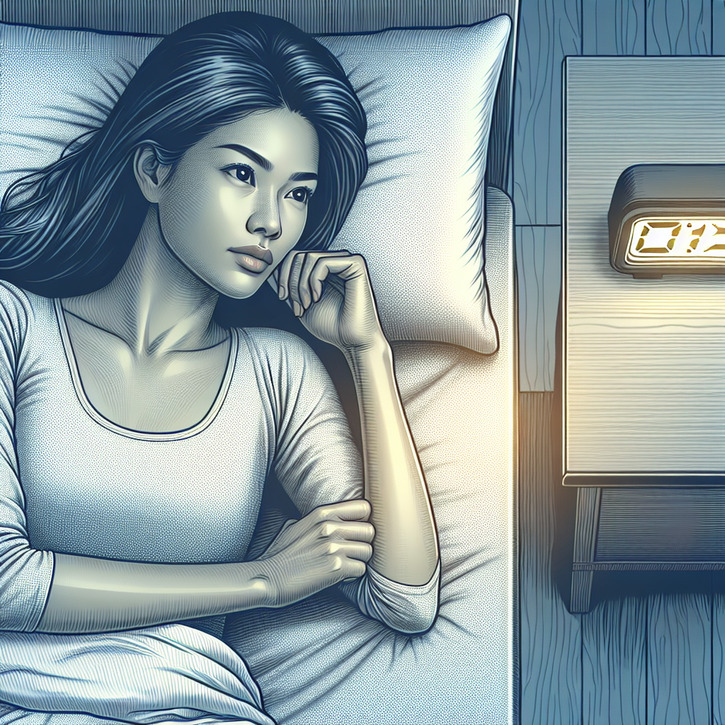sleep issues

Introducing Sleep Issues
Let’s talk about sleep issues—they’re essentially all the hurdles that keep us from getting that deep, refreshing slumber we all crave. Whether it’s tossing and turning when trying to fall asleep, waking up repeatedly, or simply feeling unrested no matter how many hours you clock in, these challenges can throw a wrench into your everyday life. Whether it's dealing with chronic insomnia, sleep apnea, or other sleep disturbances, knowing what’s really going on is key. After all, sleep is the bedrock of good health, fueling our ability to think clearly, manage our emotions, and even recover physically. Here, we’re diving into what sleep issues are all about, how common they are, and why taking proactive steps matters.
In today’s fast-paced world—think endless screen time, sky-high stress levels, and chaotic schedules—sleep problems seem to be on the rise. Studies suggest that millions of people are caught in this struggle, and the fallout affects productivity, mood, and our physical wellbeing. When you’re not sleeping right, fatigue quickly becomes more than just annoying; it’s a sign that your long-term health is at risk. We’re here to share insights from years of experience and research, so you can better understand and tackle your sleep struggles head-on.
What Are Sleep Issues, Anyway?
At its simplest, sleep issues cover any snags in the sleep cycle that stop you from getting that all-important, restorative rest. It might be ongoing insomnia, trouble nodding off, frequent interruptions, or even conditions like snoring and sleep apnea. Despite their varied symptoms, these issues all wreak havoc on your daily routine. They interrupt the vital repair processes that happen during deep sleep, setting off a chain reaction of physical, mental, and emotional challenges. Spotting the early warning signs means you can set yourself on the path to a solid treatment plan.
With our increasingly hectic lifestyles, sleep issues have become more common than ever. The boundaries between work and rest blur, making irregular sleep schedules the new norm and reducing sleep quality overall. What starts as an occasional sleepless night can quickly escalate into a long-term problem if left unchecked. Getting clued-up on sleep hygiene and listening to your body’s signals is crucial. This section is your starting point for digging deeper into why these issues pop up and what you can do about them.
How Widespread Are Sleep Issues and What’s the Big Picture?
These days, sleep issues are showing up everywhere—across all ages, genders, and walks of life. Research indicates that roughly 30-40% of adults find themselves wrestling with sleep troubles at some point. And it’s not just a personal setback; it’s a broader societal challenge. The ripple effects include soaring healthcare costs, dips in workplace productivity, and even a spike in accidents, whether on the roads or at work. Clearly, sleep problems are more than just a personal inconvenience—they’re a major public concern that calls for greater awareness and tailored solutions.
On top of that, sleep issues often mess with not just your sleep, but how you connect with family, friends, and colleagues. When you’re running on empty, stress management, effective communication, and sound decision-making can all take a hit. It becomes a vicious cycle where poor sleep leads to more problems, affecting every part of your life. Seeing sleep issues as a piece of a much larger puzzle is essential; by tackling them in a comprehensive way, we can help restore balance not just individually, but throughout the community.
Why Tackling Sleep Issues Is a Must
Addressing sleep issues goes beyond banishing daytime drowsiness—it’s about laying the groundwork for long-term health and a fulfilling life. When sleep falters, everything from mental sharpness and physical performance to emotional stability takes a hit. Good sleep serves as a crucial reset button for our bodies and brains, reducing the risk of chronic conditions like obesity, heart disease, and diabetes. Plus, a solid sleep routine supports better decision-making and stress management, which bolsters our overall resilience.
Plus, catching sleep problems early can prevent more serious health complications down the line. Restorative sleep isn’t a luxury; it’s a necessity for letting your brain absorb new information, mend tissues, and lock in memories. Our approach is all about staying proactive—by raising awareness, doing regular self-checks, and following through with the right treatment plans, you can see dramatic improvements in sleep quality. Investing in your sleep today can spark transformative changes in both your personal and professional life.
What Triggers Sleep Issues?
The reasons behind sleep issues are as varied as they are complex. Multiple factors, often tangled together, could be messing with your sleep. Environmental and lifestyle elements, with stress playing a starring role, often kick off these problems. The interplay between these factors can set off a vicious cycle—poor sleep ramps up stress, which then further disrupts sleep. Spotting and tackling these triggers is the first step toward a more peaceful night’s rest.
By understanding that the causes of sleep disruptions can be multi-layered, you empower yourself to break the cycle of sleeplessness. Whether it’s the hustle and bustle of city life, a demanding job that shuffles your sleep schedule, or underlying medical conditions, every factor leaves its mark. With some honest self-reflection and perhaps a bit of professional guidance, you can pinpoint the source of your sleep woes and take more personalized steps toward better sleep.
How Our Lifestyle Steals Our Sleep
Our everyday habits can be major culprits behind sleep problems. In a digitally dominated world, burning the midnight oil on our screens, chugging too much caffeine, and maintaining erratic sleep routines are all red flags for disrupted sleep. Most of us continue these habits without fully realizing their cumulative impact on our nightly rest. Societal pressures, work demands, and the need to be constantly connected make it all too easy to lose track of what a healthy sleep routine should look like.
One clear lifestyle offender is the screen time right before bed. The blue light from phones and laptops can throw off your melatonin production—the hormone that cues your body to wind down. Add in late-day high-sugar and high-caffeine snacks, and it’s no wonder your sleep gets thrown off kilter. Tweaking your daily routine and dietary habits can lead to notable improvements in both how easily you fall asleep and how well you sleep. Often, the journey to better sleep starts with simple, small changes.
When Your Environment Fights Against a Good Night’s Sleep
Ever notice how your bedroom or even your neighborhood can affect how well you sleep? Environmental triggers like annoying noise, the wrong type of lighting, an uncomfortable mattress, or even an improperly heated or cooled room can all chip away at your sleep quality. These external factors can cause you to wake up multiple times at night, leaving you feeling less than refreshed in the morning.
Imagine being kept awake by the hum of city traffic or disruptive streetlights—small adjustments, like installing blackout curtains or a white noise machine, can make a world of difference. By curating a calm and controlled sleep environment, you can overcome many of the external factors that derail your sleep. This straightforward yet powerful strategy is often the unsung hero for many battling sleep issues.
Medical Factors Behind Sleep Problems
Beyond lifestyle and environmental factors, a number of medical conditions can also throw your sleep rhythm off balance. Chronic pain, breathing difficulties, and mental health issues like anxiety and depression are all known to interfere with sleep. Hormonal fluctuations—whether from aging or specific disorders—can also disrupt your sleep cycle. If sleep problems start showing up along with other symptoms, it might be time to have an open chat with your healthcare provider, as these could be signs of deeper issues.
Sometimes, medications meant to help you manage other health concerns might inadvertently keep you up at night. Recognizing that your overall health and sleep quality are closely intertwined is a key part of crafting an effective treatment plan. With the right mix of awareness and professional help, many of these challenges can be managed, letting you reclaim the restorative sleep your body desperately needs.
The Far-Reaching Effects of Sleep Issues on Your Health
The fallout from ongoing sleep issues goes well beyond just feeling groggy during the day. Lack of proper sleep spells trouble for your overall health, touching everything from your physical state to cognitive performance and emotional wellbeing. When you skimp on sleep, your immune system takes a hit, leaving you more vulnerable to infections and other illnesses. Recent research underlines how poor sleep is linked to numerous physical ailments, making it clear that sleep problems need to be tackled head-on.
Many argue that the true cost of sleep deprivation is underestimated, especially given its ties to chronic conditions affecting everything from blood sugar levels to heart health and even weight management. This all shows that improving sleep isn’t just about comfort—it’s a critical element in preventing and managing a host of health issues. By understanding these wide-ranging effects, it becomes clear why prioritizing good sleep is so essential.
How Sleep Issues Undercut Your Physical Health
When your sleep quality takes a nosedive, your physical health often pays the price. Over time, sleep problems can weaken your immune system, ramp up inflammation, and boost your risk for chronic conditions like heart disease and diabetes. Without that restorative sleep, your body’s natural repair processes slow down, messing with your metabolism and energy levels. This domino effect leaves you more prone to injuries and common illnesses.
Conditions like obesity and high blood pressure are frequently tied to ongoing sleep disturbances. Without a full night’s sleep, hormonal imbalances can develop, altering your appetite and stress responses. The result? A cycle of unhealthy choices and diminishing quality of life. Combining efforts to address sleep issues with a healthy lifestyle can go a long way in boosting your physical resilience. Recognizing and treating sleep disruptions is a key step in safeguarding your long-term physical health.
Sleep Issues and Their Impact on Mental Health
The relationship between your mind and body is undeniable, and sleep plays a huge role in keeping both in check. Chronic sleep issues can ramp up your stress levels, stir up anxiety, and even trigger bouts of depression. When your brain isn’t getting the downtime it needs, it’s no surprise that concentration, memory, and decision-making go off track. People wrestling with sleep problems often report mood swings, irritability, and a general feeling of emotional burnout.
Creating an environment that supports solid, restorative sleep is one of the most effective ways to combat these mental health challenges. Establishing consistent sleep patterns and digging into the root causes of sleep issues can really help smooth out those mood swings. Mental health professionals often point out that well-rested individuals are better equipped to manage day-to-day stress. It’s clear that a comprehensive strategy—one that respects both sleep and mental health—is the best way to achieve lasting improvement.
How Do We Diagnose Sleep Issues?
The first step toward getting your sleep back on track is a proper diagnosis, and this usually starts with a detailed rundown of your medical history and a chat with your healthcare provider. They’ll dig into your sleep habits, lifestyle, and overall health to identify what’s really messing with your rest. Factors like stress, work routines, and even your diet might come under scrutiny as they piece together the puzzle. This holistic approach helps make sure no detail is overlooked when it comes to pinpointing the root causes of your sleep troubles.
With diagnostic techniques evolving all the time, doctors now blend traditional evaluations with advanced technology to shed light on sleep issues. Whether you’re keeping a sleep log or undergoing detailed examinations, each method provides insights that lead to a personalized treatment plan. This evidence-based approach really underscores how crucial professional guidance is in managing sleep problems effectively.
What Happens During Medical Evaluations for Sleep Issues?
When it comes to assessing sleep issues, the process is often all about combining your health history with physical exams and expert consultations. These evaluations help doctors figure out whether your sleep problems are mainly due to lifestyle, your environment, or underlying health conditions. Getting a thorough look at your situation is essential so that every contributing factor can be considered before any interventions are recommended.
Such evaluations not only help determine the severity of your sleep issues but also explore how they might be interacting with other aspects of your health. Conditions like cardiovascular disease, metabolic issues, or even psychiatric concerns can sneak into the picture. By zeroing in on these root causes, doctors can tailor a treatment plan just for you. Early and accurate diagnosis is your best defense, empowering you to make informed decisions about your sleep health.
Under the Microscope: Sleep Studies and Diagnostic Tests
Ever heard of sleep studies? These are conducted in specialized clinics and offer a deep dive into the nature and intensity of your sleep issues. Using modern equipment, sleep specialists track your brain activity, heart rate, breathing patterns, and even muscle movements overnight. This comprehensive snapshot helps pinpoint disruptions in your sleep cycle—like sleep apnea or restless leg syndrome. Although the thought of a sleep study might seem a bit intimidating, the payoff of a precise diagnosis far outweighs any temporary inconvenience.
For many, a sleep study is a turning point in the journey to reclaiming a good night’s sleep. The data collected enables medical professionals to recommend targeted treatments, whether through behavioral changes, medical devices, or medication. Thanks to advances in technology, modern sleep studies are both comfortable and highly informative, paving the way for effective, personalized care. It’s a great example of how blending traditional evaluations with new diagnostic tools can lead to better sleep health.
Self-Assessment Tools: Your First Step in Spotting Sleep Issues
In the age of digital convenience, there are plenty of self-assessment tools out there to help you spot potential sleep problems before they get out of hand. From online questionnaires to mobile apps and sleep diaries, these tools let you track your sleep patterns and gauge the quality of your rest. Keeping tabs on your sleep can help you notice recurring issues like difficulty falling asleep or frequent night awakenings. They’re a handy way to gather some personalized insights and serve as a great complement to professional evaluations.
While these self-assessment tools aren’t a substitute for medical advice, they’re a fantastic first step in raising your awareness about sleep issues. Many healthcare providers actually recommend maintaining a sleep log for a few weeks as part of the diagnostic process. The data you collect can help confirm your sleep disturbances and guide you toward the proper next steps. When used alongside professional assessments, these tools can demystify your sleep patterns and set you on the path to better overall wellbeing.
Exploring Treatment Options for Better Sleep
If you’re wrestling with sleep issues, rest assured there are numerous treatment options available—from behavior-focused therapies to more conventional medical interventions and even alternative remedies. The right approach really hinges on what’s causing your sleep disturbances and how severe they are. For many, tweaking daily routines and using behavioral strategies can work wonders on sleep quality. In some cases, though, medications or therapeutic devices might be the ticket. The key here is that there’s no one-size-fits-all remedy—treatment has to be as individual as you are.
It’s crucial to work closely with healthcare professionals to pinpoint the treatment options that fit your needs best. Merging evidence-based practices with holistic approaches can lead to noticeable improvements. Whether through cognitive behavioral therapy, traditional medicine, or natural remedies, effective treatment empowers you to take back control of your sleep. Keeping an open line of communication with your provider allows you to tweak your treatment plan as your sleep needs evolve.
Behavioral Therapies: A Friendly Approach to Better Sleep
Behavioral therapies are making waves as a non-invasive and effective way to tackle sleep issues. One standout method is Cognitive Behavioral Therapy for Insomnia (CBT-I), which helps shift those negative thought patterns and habits around sleep. From establishing consistent sleep schedules to reworking your bedtime routines and exploring relaxation techniques, these therapies focus on smoothing out the psychological wrinkles that lead to restless nights. Plenty of studies back up the benefits of these behavioral tweaks, showing significant improvements in both sleep quality and duration.






